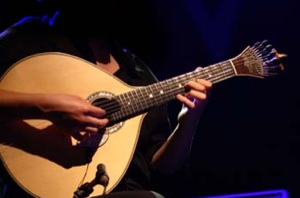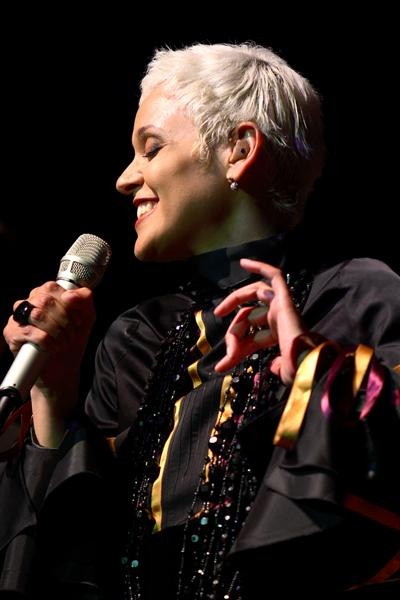FADO

“Saudade” or longing, missing and yearning, is the main deep-seated feeling behind this folk music. But Fado means destiny, or fate. Something you cannot break away from, that life chains to you, a weight or light to be carried always. “Saudade” is proudly defined by the Portuguese as a rooted feeling that rarely abandons the soul of those who left their homeland. Fado also sings about love, the longing for those who have left, the sea, the misfortunes of life, and refers many times to the lives of fishermen and sailors.
Sang with a shawl, a guitar, and one voice, whether it’s a man or a woman, Fado never lacks in emotion. A performance is good, when the crowd is brought to tears. It is one of the oldest urban folk music in the world, and increasingly admired, respected and liked throughout the whole world.
A bit of history...
The popular version of the history of Fado says that Fado was heard many years ago, sang by the Moors who still occupied the “Mouraria” in Lisbon after the Christians re-conquered the city. However, the first register of Fado is only seen in the beginning of the XIXth century. It is only during the dictatorship of Salazar (1926 - 1968) that Fado became a profession, as Salazar decided to confine the singers to the so called “revistas” and Fado houses, later promoting the country and its national feeling by sending the fadistas and this folk music to the world. One of the most famous singers of this time was Amália Rodrigues, who represented the country and Portuguese nationalism around the globe.
With the fall of the dictatorship in 1974, Fado was a symbol of a gloomy Portugal, stuck to the past in an ever evolving and rapidly developing world. A great group called Madredeus emerged in the late XXth Century, with the lead singer’s beautiful soprano voice accompanied by acoustic guitars and an accordion. Later appeared Mariza, probably the most important single singer after Amália Rodrigues, recognised for her talent, her voice, her sentiment, and her avant-garde style.
The faces of Fado
Amália Rodrigues
Remembered for her courage, her force, her voice, her Fado, and above anything, her soul, Amália Rodrigues is one of Portugal’s most important symbols. On the 6th of October of 1999, Amália died leaving behind a great “saudade”.

Born some day between the first and twenty third of June 1920, Amália Rodrigues was the fifth of nine children. At the age of fifteen she sings her first solo performance, accompanied by her uncle playing the guitar. Quickly she became one of the most important Portuguese symbols. She adapted poems by great Portuguese poets into Fado lyrics. Known for singing “Uma casa Portuguesa”, “Fado Português” and “Libertação” she projected Portugal to the world during one of the longest dictatorships of the whole of Europe. She became a symbol of tradition and resistance. The Portuguese President at the time of her death, Jorge Sampaio, said of Amália, “She gave a new face to the Portuguese identity. Amália dies, but will forever live in her Fado and her music.” The country mourned her loss for three days.
Mariza

Mariza is one of the most revolutionary names and people in the Fado culture (together with Amália Rodrigues). Fado used to be related to the old, the conservative, the traditional; symbols of a repressive dictatorship under Salazar. Being young, modern, original, and with Fado in her soul Mariza has attracted newer and younger fans to this Portuguese music. She appeared as a contemporary and creative artist using avant-garde clothes rather than the old black shawls. Her lyrics and tunes shake hearts and souls all over the world.
Born in the capital city o Mozambique, this young girl moved to Lisbon at an the early age of three. Due to her father’s passion for this Portuguese folk music, Mariza heard Fado since she can remember. In Lisbon, Mariza’s family lived in the “Mouraria” neighbourhood, the true house and heart of Fado, and her contact with this music was daily. Mariza began to sing after receiving her first shawl at the age of five. Only during her teenage years did Mariza gain credit for her talent. Nowadays she is one of the most important Fado singers in history, with moving and sentimental songs such as, “Ó Gente da Minha Terra”.
Listen to Fado
Fado in Chiado
Listen to Fado in two voices. A woman and a man join to mark the bridge between the past and modern times. For fifty intense minutes you can enjoy the sound of Fado with a different touch to it.
Fado houses
Visit some of the most famous Fado houses in Lisbon. Without a doubt, going around the Bairro Alto as well as Alfama areas you will find plenty.
Café Luso
This house claims to be one of the oldest Fado houses in the city. Established in 1927, all the major Fado singers have performed in these XVIIth century wine cellars, including Amália Rodrigues. Apart from Fado, here you will also see a performance by a folklore group of 14 elements. This is a traditional Portuguese dance, still practiced during traditional festivities. Apart from the peculiar, and easy-to-follow steps, there are very colourful typical costumes to go with it.
Clube de Fado
Right in the heart of the Alfama district you will find the Clube de Fado. One of this restaurant and Fado house’s peculiarity is an old wishing well, where you may make a wish on your way out.
Parreirinha de Alfama
This Fado house is situated in one of the most typical neighbourhoods of Lisbon, Alfama, and D. Argentina Santos, a well-known Portuguese Fado singer, runs a small restaurant in a dead-end street in between the various houses of this neighbourhood. The small and cosy dining room is a pleasant place to make “silence, as Fado is going to be sung”, whilst you eat a typically cooked Portuguese meal.
Adega do Ribatejo
With a very interesting show, the Adega do Ribatejo, in the heart of the Bairro Alto area is worth a visit for those earning to spend an evening to the sound of Fado. Here the Fado is like a Fado Vadio, meaning a bohemian or loafer Fado that expresses emotions more than it tries to be commercially accepted. First the waitresses sing, then the cooks, wearing their work clothes. Visit the Adega do Ribatejo for a different kind of show.
Shopping
Down the Rua do Carmo, a small green van is parked there every day, filling the streets with the sounds of Fado. Here you may purchase most CD’s available in the market.
Are you planning a trip to Lisbon and looking for a place to stay?
Visit our website: www.portugal-live.net/UK/hotels.html
A bit of history...
The popular version of the history of Fado says that Fado was heard many years ago, sang by the Moors who still occupied the “Mouraria” in Lisbon after the Christians re-conquered the city. However, the first register of Fado is only seen in the beginning of the XIXth century. It is only during the dictatorship of Salazar (1926 - 1968) that Fado became a profession, as Salazar decided to confine the singers to the so called “revistas” and Fado houses, later promoting the country and its national feeling by sending the fadistas and this folk music to the world. One of the most famous singers of this time was Amália Rodrigues, who represented the country and Portuguese nationalism around the globe.
With the fall of the dictatorship in 1974, Fado was a symbol of a gloomy Portugal, stuck to the past in an ever evolving and rapidly developing world. A great group called Madredeus emerged in the late XXth Century, with the lead singer’s beautiful soprano voice accompanied by acoustic guitars and an accordion. Later appeared Mariza, probably the most important single singer after Amália Rodrigues, recognised for her talent, her voice, her sentiment, and her avant-garde style.
The faces of Fado
Amália Rodrigues
Remembered for her courage, her force, her voice, her Fado, and above anything, her soul, Amália Rodrigues is one of Portugal’s most important symbols. On the 6th of October of 1999, Amália died leaving behind a great “saudade”.

Born some day between the first and twenty third of June 1920, Amália Rodrigues was the fifth of nine children. At the age of fifteen she sings her first solo performance, accompanied by her uncle playing the guitar. Quickly she became one of the most important Portuguese symbols. She adapted poems by great Portuguese poets into Fado lyrics. Known for singing “Uma casa Portuguesa”, “Fado Português” and “Libertação” she projected Portugal to the world during one of the longest dictatorships of the whole of Europe. She became a symbol of tradition and resistance. The Portuguese President at the time of her death, Jorge Sampaio, said of Amália, “She gave a new face to the Portuguese identity. Amália dies, but will forever live in her Fado and her music.” The country mourned her loss for three days.
Mariza

Mariza is one of the most revolutionary names and people in the Fado culture (together with Amália Rodrigues). Fado used to be related to the old, the conservative, the traditional; symbols of a repressive dictatorship under Salazar. Being young, modern, original, and with Fado in her soul Mariza has attracted newer and younger fans to this Portuguese music. She appeared as a contemporary and creative artist using avant-garde clothes rather than the old black shawls. Her lyrics and tunes shake hearts and souls all over the world.
Born in the capital city o Mozambique, this young girl moved to Lisbon at an the early age of three. Due to her father’s passion for this Portuguese folk music, Mariza heard Fado since she can remember. In Lisbon, Mariza’s family lived in the “Mouraria” neighbourhood, the true house and heart of Fado, and her contact with this music was daily. Mariza began to sing after receiving her first shawl at the age of five. Only during her teenage years did Mariza gain credit for her talent. Nowadays she is one of the most important Fado singers in history, with moving and sentimental songs such as, “Ó Gente da Minha Terra”.
Listen to Fado
Fado in Chiado
Listen to Fado in two voices. A woman and a man join to mark the bridge between the past and modern times. For fifty intense minutes you can enjoy the sound of Fado with a different touch to it.
| DATE: |
Every day (except sundays) |
| TIME: | 19h |
| PLACE: | Cine Theatro Gymnasio - Espaço Chiado, R. da Misericórdia 14 |
| PRICE: |
15€ |
| TRANSPORT: |
Metro: Baixa-Chiado (green line) |
| CONTACT: | +351 961 717 778 +351 213 430 184 |
Fado houses
Visit some of the most famous Fado houses in Lisbon. Without a doubt, going around the Bairro Alto as well as Alfama areas you will find plenty.
Café Luso
This house claims to be one of the oldest Fado houses in the city. Established in 1927, all the major Fado singers have performed in these XVIIth century wine cellars, including Amália Rodrigues. Apart from Fado, here you will also see a performance by a folklore group of 14 elements. This is a traditional Portuguese dance, still practiced during traditional festivities. Apart from the peculiar, and easy-to-follow steps, there are very colourful typical costumes to go with it.
| WHERE: |
Travessa da Queimada, 10 (Bairro Alto) 1200-365 Lisboa |
| CONTACTS: |
Phone: +351. 213 422 281 Website: www.cafeluso.pt |
| OPENING TIMES: | Open daily, including holidays: 19h30 - 02h00 |
| TRANSPORT: | Bus stop (number 58 + 790) and Metro Station "Baixa-Chiado" |
| ADDITIONAL INFO: | 160 seats Air-conditioned 3 Car Parkings nearby All major credit cards accepted |
Clube de Fado
Right in the heart of the Alfama district you will find the Clube de Fado. One of this restaurant and Fado house’s peculiarity is an old wishing well, where you may make a wish on your way out.
| WHERE: |
Rua São João da Praça, 94 (near the Sé) |
| PRICE: | Main dishes average at 23 € |
| CONTACTS: |
Phone: +351 21 885 2704 Website: www.clube-de-fado.com |
| OPENING TIMES: |
20h - 02h every day |
| ADDITIONAL INFO: |
88 seats Car parking - close to the Sé, Campo das Cebolas, Praça da Figueira All major cards accepted |
Parreirinha de Alfama
This Fado house is situated in one of the most typical neighbourhoods of Lisbon, Alfama, and D. Argentina Santos, a well-known Portuguese Fado singer, runs a small restaurant in a dead-end street in between the various houses of this neighbourhood. The small and cosy dining room is a pleasant place to make “silence, as Fado is going to be sung”, whilst you eat a typically cooked Portuguese meal.
| WHERE |
Beco do Espírito Santo, 1, 1100 - 220 Lisboa |
| AVERAGE PRICE |
35€ |
| CONTACTS |
+351 218 868 209 |
| TIMES |
20h - 03h every day |
Adega do Ribatejo
With a very interesting show, the Adega do Ribatejo, in the heart of the Bairro Alto area is worth a visit for those earning to spend an evening to the sound of Fado. Here the Fado is like a Fado Vadio, meaning a bohemian or loafer Fado that expresses emotions more than it tries to be commercially accepted. First the waitresses sing, then the cooks, wearing their work clothes. Visit the Adega do Ribatejo for a different kind of show.
| WHERE |
Rua do Diário de Notícias, 23, 1200 - 141 Lisboa |
| AVERAGE PRICE |
35€ |
| CONTACTS |
+351 213 468 343 |
| TIMES |
20h - 24h every day |
| TRANSPORT |
M: Baixa-Chiado. Bus: 1, 92, 202, 758, 790. Tram: 28E |
Shopping
Down the Rua do Carmo, a small green van is parked there every day, filling the streets with the sounds of Fado. Here you may purchase most CD’s available in the market.
Are you planning a trip to Lisbon and looking for a place to stay?
Visit our website: www.portugal-live.net/UK/hotels.html







